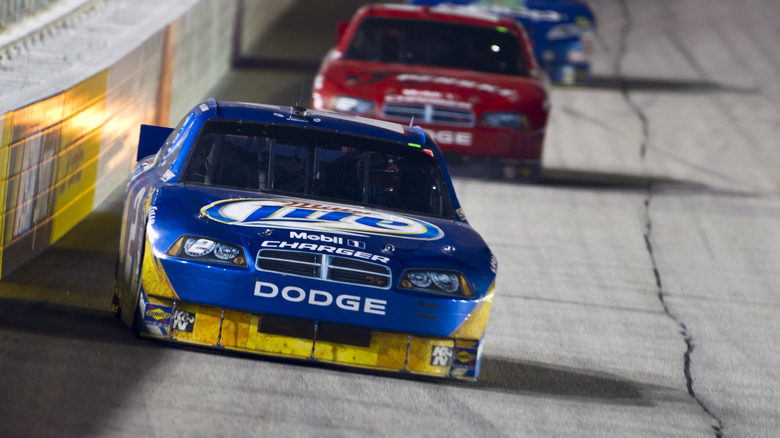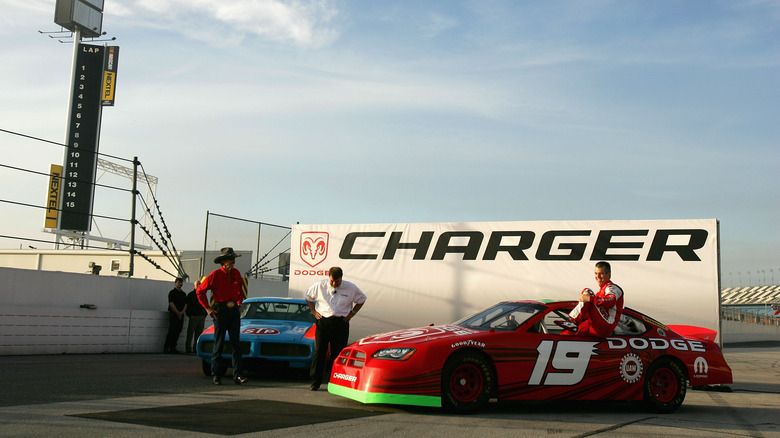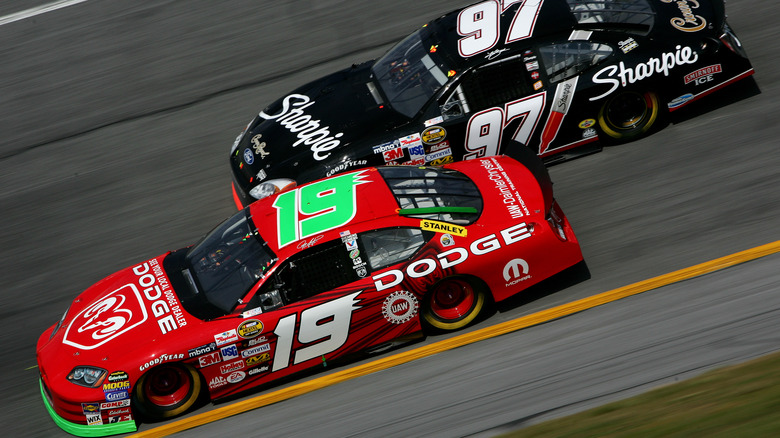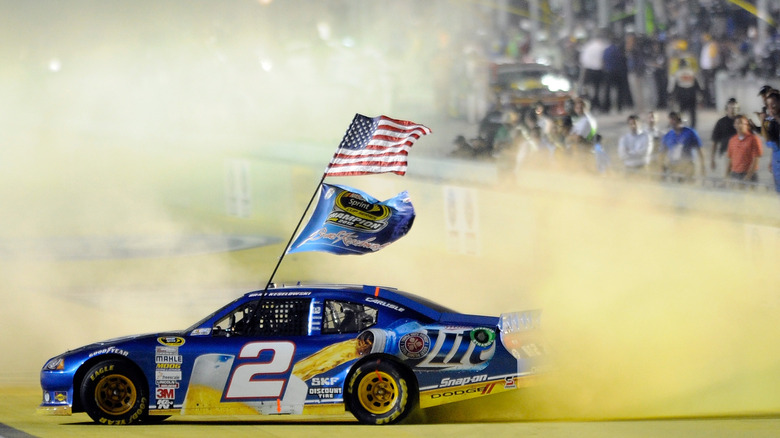Why Dodge Isn't In NASCAR Anymore (And The Last Year It Participated)
The National Association for Stock Car Auto Racing (NASCAR) has been around since its inaugural run down Daytona Beach on February 15, 1948. However, the first "Strictly Stock" race (which is now the current NASCAR Cup Series) wasn't held until the middle of the following year — June 19, 1949 — at the Charlotte Fairgrounds Speedway.
Nine manufacturers entered cars in the race, some you would never guess were ever part of NASCAR: Lincoln, Hudson, Oldsmobile, Ford, Buick, Chrysler, Kaiser, Mercury, and Cadillac. In fact, during the early days, all sorts of cars were allowed to race in NASCAR. Even Jeepster convertibles were given the green light (regular Jeeps were not). Over the years most drifted away from NASCAR, with Lincoln and Cadillac moving on to build some of America's finest luxury cars, and Hudson merged with Nash-Kelvinator to form American Motors Corporation (AMC) in 1954.
That original lineup is far from what we have today, which only features Chevrolet, Ford, and Toyota (whose story is interesting all its own). Dodge is conspicuously missing from both lists and has come and gone from the NASCAR circuit more than once. It's first foray began in 1953 with Lee Petty driving a Coronet. He won his first race in February and the championship title the following year, so its nascent NASCAR career started with a bang.
Dodge's first break from NASCAR
Even though Dodge had a beastly winner in the late 60s and early 70s with the legendary Charger Daytona (the first stock car to hit 200 mph on a NASCAR track), it stopped racing (the first time) in 1977 despite having won two manufacturers' championships in 1970 and 1975. By the late 70s, several things forced Dodge to close up its garage on pit row.
First, the Magnum was underperforming on the track, and the partnership with Mitsubishi faced difficult circumstances. The global OPEC oil crisis was wreaking havoc on the car industry, and Chrysler had been slow to adjust to the public's shift from big fuel-guzzling cars to smaller, more efficient vehicles. It finally decided it had to turn its attention to passenger car sales.
It stayed away for some 22 years, then in October 1999, announced it was finally returning to the prestigious motorsport. Somehow, Dodge managed to pry Ray Evernham away to helm the new team. Evernham had previously been the crew chief behind the wildly successful driver Jeff Gordon (driving the number 24 Chevrolet for Hendrick Motorsports).
Evernham Motorsports won its first race for Dodge at the Michigan International Speedway in 2001. Soon after, a number of additional racing teams (Chip Ganassi, Bill Davis, Melling, and Petty Enterprises) switched to Dodge. The pièce de résistance came when Team Penske left Ford for Dodge, bringing drivers Ryan Newman and Kurt Busch with them. A fabulous new era seemed imminent, but what followed was anything but.
A story made for a daytime soap opera
Things ran smoothly for a while. Evernham snatched up budding star driver Kasey Kahne to bolster a team that already included Jeremy Mayfield plus Newman, and Busch. The seemingly bright future only lasted a few years though, because internal strife and global economics soon affected the team.
First, Mayfield's 2006 season was, in a word, terrible, narrowly finishing in the top 35 driver standings. He blamed his poor performance on Evernham, claiming Evernham was more interested in female driver Erin Crocker than the team, a relationship Evernham later admitted (which hurt Crocker's career). This caused a massive rift.
During a race at the Brickyard at Indianapolis' Motor Speedway, Mayfield crashed his car, wrecking the season in the process. Evernham kicked him off the team (replaced by Elliott Sadler) claiming Mayfield crashed intentionally. With things spiraling, Evernham sold off his majority share to George Gillett, and the team rebranded as Gillett Evernham Motorsports. The soap opera didn't end there though.
Chrysler posted a loss of over $1.5 billion in 2006, causing Daimler to sell off the Chrysler Group in 2007, which turned out to be another terrible season for the racing team. Dodge was having a hard time getting the Charger's new nose to work properly, and the Avenger (part of NASCAR's Car of Tomorrow initiative) only managed three victories. Elliot Sadler and Scott Riggs finished 25th and 36th respectively in the point standings, with Kasey Kahne even further back.
Dodge went out with a checkered flag
The 2008 season was only marginally better, but even bigger things were at play outside the track: the Great Recession, automobile industry bailouts, and Chrysler's filing for bankruptcy. Gillett Evernham Motorsports had no choice but to merge with Petty Enterprises in 2009, forming Richard Petty Motorsports (RPM). Unfortunately, an April 2009 bankruptcy was a significant blow because Chrysler stopped payments to RPM.
However, in 2010, Brad Keselowski won NASCAR's second-tier Nationwide Series championship while driving a Dodge for Penske Racing. Keselowski was the latest superstar driver, and some hoped he could bring Dodge back as a contender.
In 2011, NASCAR announced it was finally moving away from carburetors – which had been in use since 1949 — in stock cars toward the modern electronic fuel injection for the 2012 season, a season that, ironically enough, saw Keselowski win NASCAR's upper echelon Cup series, again driving a Dodge for Penske Racing.
Despite the turn of fortune, Dodge's soap opera was destined to have only one outcome. In March 2012, Penske Racing announced it was returning to Ford at the end of the season — a stunning reversal of what it did 12 years earlier. Dodge's second stint in NASCAR ended with 55 additional wins (making for a total of 215), seven of eight seasons making it to the NASCAR Chase for the Cup, and a championship in their final year. Despite rumors of a return, Dodge still remains absent from NASCAR.



